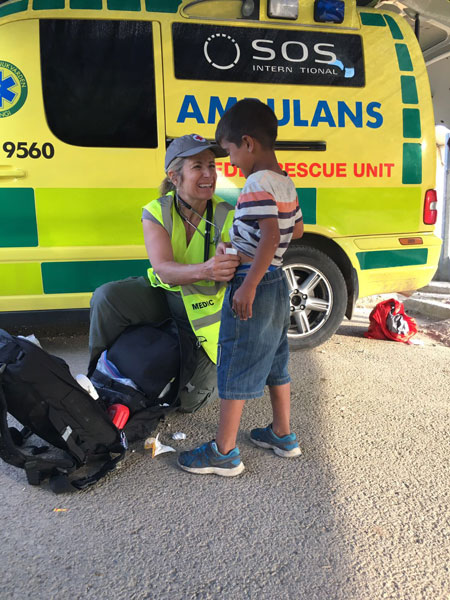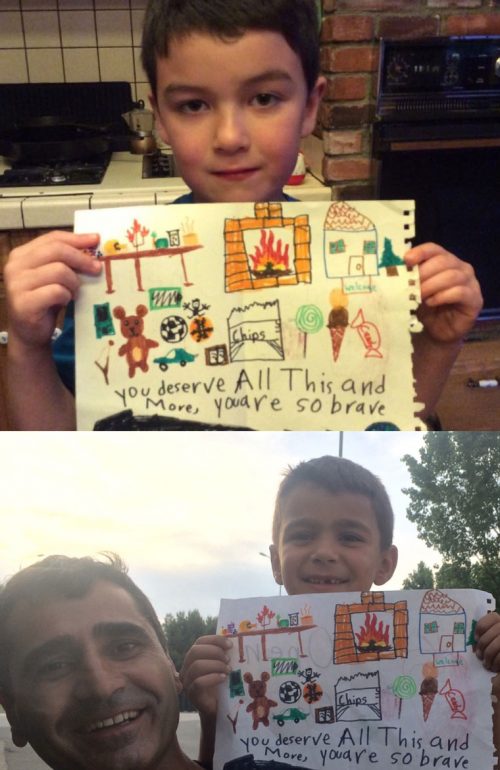
Photo courtesy of Mary Lehman
Local resident and attorney Mary Lehman has a busy life and career. But it is not too busy for her to lend her skills as a volunteer emergency medical technician to the escalating refugee crisis in Europe.
Last November, Lehman went to the Greek island of Lesbos, just off the Turkish coast. She had read of the developing emergency on Lesbos — no organized camps ready to receive refugees, people dying at sea and confusion on the ground. She arrived prior to any organized structure having been put in place to deal with the medical and psychological needs of the arriving refugees.
After returning to the U.S. she continued to wake at night believing she was still there, crawling around her bedroom trying to find her headlamps and emergency equipment so she could meet arriving boats.
Since November, the crisis has been exacerbated by border closures and disagreements within the European Union over how to deal with refugees who continue to make the treacherous crossings to Greece. The result has been to strand thousands of refugees at camps both official and unofficial throughout Greece, and especially on the border with Macedonia (officially the former Yugoslav Republic of Macedonia).
Lehman felt she had to return. She had the medical skills and facility with languages that would be useful. In May, she went back, initially to an unofficial camp called Idomeni in Greece, just south of the border with Macedonia.
First planned as an unofficial settlement for 2,000 mostly Syrian and Iraqi refugees, the camp had more than 12,000 at the time Lehman arrived. Panagiotis Kouroumblis, the Greek interior minister, called the conditions at Idomeni comparable to Nazi concentration camps. “The situation here is tragic,” he said. “It doesn’t honor the civilized world, it doesn’t honor Europe. This is the result of the logic of closed borders.” This was where Lehman had gone to volunteer.
“The camp was closed after the first five days I was there,” she said. Although resistant, refugees were being moved to “official” camps run by the Greek military with strict entry and exit requirements.
Lehman explained that, based on agreements within the EU, refugees who arrived in Greece prior to March 20 were entitled to a “presumption” they had valid claims for asylum status, pending official review of their claims and documents. Those who came after were more likely to be returned to Turkey, regardless of whether other family members had already reached countries such as Germany and had been granted asylum.
Lehman noted that review of eligible cases could take six months to a year and many within the camps, official or unofficial, were losing hope. “The biggest distinction from my first trip [to Lesbos] was the despair in these camps. Many had lost hope. When I was in Lesbos, arriving refugees were joyful to have gotten to European soil.” Now, not knowing how long it would take or even if their asylum claims would be granted, the current refugees were hopeless.

Photos courtesy of Mary Lehman
Even though she went as a medic, Lehman’s time was spent primarily as a medical administrator. After the closure of Idomeni, she went to a spontaneous self-organized camp that formed around an Echo gas station in Chalkidona. “The medical care was easier; not so many emergencies,” she said. Because she had acquired some knowledge of Arabic and a working knowledge of Greek, she acted as translator and initial triage diagnostician. “Everyone came through me and then on to specific medical care,” said Lehman. “We processed about 60 patients per day.”
Lehman is already thinking of returning, next time to help in dispensing information. “More than anything, [the refugees] need information,” she said. “More than half are women and children with [male relatives] who are already in Europe [countries accepting asylum claims]. The problem now is information flow — providing answers to the people waiting. People are stranded with no knowledge of if or when they might be able to move on.”
Going forward, the process for resettlement of the refugees already in Greece is very complicated. Refugees must pre-register at designated sites and then get an appointment at a designated asylum service office for an interview at which they explain why they need asylum. Only people who have entered Greece between Jan. 1, 2015, and March 20, 2016, can pre-register. They must also hold a police note acknowledging their presence in Greece and be living on the mainland.
Lehman said she is considering using her legal skills on her next trip, volunteering with a group called Advocates Abroad. Advocates Abroad is a field-based team of lawyers who provide legal aid to refugees in camps and detention centers with a particular focus in Greece.
Lehman talked about the hospitality and graciousness of the Greek people, especially under strained economic conditions. “The camp that formed around the gas station was something that would not have happened in the U.S.,” said Lehman. “The owner of the station provided services to the refugees and locals continued to come to the gas station to fill their tanks. The surrounding business owners made money, but it was their hospitality in allowing an area to literally be transformed into a village in Syria. That was amazing.”










